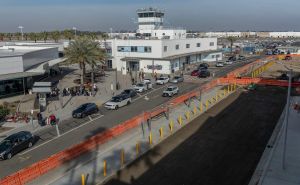Namibia is on the brink of making history with its upcoming presidential election, slated for November 27, 2024. This election could see Vice President Netumbo Nandi-Ndaitwah becoming the country's first female president. With approximately 1.4 million registered voters and 15 political parties vying for power, the stakes are high as the ruling SWAPO Party, which has governed since Namibia's independence from South Africa's apartheid regime in 1990, faces increasing challenges.
SWAPO's grip on power has weakened over the years, particularly highlighted by their loss of a two-thirds majority in the National Assembly during the 2019 elections. This decline has been attributed to allegations of corruption, particularly scandals involving the fishing industry. The arrests of two cabinet ministers and widespread criticisms have contributed to disillusionment among voters.
Nandi-Ndaitwah, 72, is campaigning with bold promises, including addressing the pressing issue of youth unemployment, which currently stands at 20%. She has unveiled plans for ambitious job creation, proposing to generate 500,000 jobs within five years, backed by significant investments totaling 85 billion Namibian dollars (approximately $4.7 billion).
This election is not just about political transition; it reflects broader regional trends as incumbents across Southern Africa face significant losses. South Africa's African National Congress recently lost its decades-long parliamentary majority, and the Democratic Party of Botswana was ousted after being in power for 58 years. These shifts indicate a growing electorate focused on governance and accountability rather than allegiance to historical liberation narratives.
Political analysts warn SWAPO must engage younger voters, who are increasingly disconnected from the party's liberation legacy. Henning Melber, a political analyst, emphasizes the necessity for SWAPO to adapt to contemporary issues if they want to reclaim their former dominance. The so-called "born-frees," Namibians born after independence, are pivotal. They are expected to prioritize policy effectiveness and government performance over historical allegiance.
Key campaign topics for Nandi-Ndaitwah include women's rights, reproductive health, and equal pay. Her potential presidency would place her alongside other notable female African leaders like Liberia’s Ellen Johnson Sirleaf and Malawi’s Joyce Banda, marking a significant milestone for gender representation on the continent.
The Independent Patriots for Change and the Affirmative Repositioning party represent formidable opposition to SWAPO. Both parties are capitalizing on public sentiment, tapping dissatisfaction with current governance. The electoral climate is charged, with heightened expectations for transparent governance and increased political representation for women, should Nandi-Ndaitwah secure the presidency.
These elections will not only test SWAPO's resilience but also gauge how effectively political parties can respond to changing voter dynamics. With significant historical precedent and regional ramifications, all eyes are on Namibia as the nation prepares to step onto this pivotal stage.
Across Southern Africa, recent political movements indicate significant shifts. Amidst these changes, Namibia stands poised at the forefront, with the upcoming elections underlining not just the potential for leadership change, but also a redefined relationship between the electorate and its political class. The outcome could either solidify SWAPO’s longstanding legacy or herald the dawn of new political realities for Namibia.
Voters are increasingly concerned about pressing issues, including economic stability, healthcare accessibility, and education. There is hope among many Namibians for substantive changes to be initiated by the next administration, regardless of party lines. Education reform and economic diversification are high on the public's agenda, as many perceive the current administration as having been too slow to address these eternal challenges.
On the ground, there’s palpable excitement and anxiety as the nation holds its breath. Campaigns have been intense, with both government officials and opposition leaders making their rounds to rally support. The coming days will reveal which narratives resonate the most with voters and whether historical ties will weigh heavily on the polls.
Election monitors are also gearing up for the event, with national and international observers committing to watch over the electoral processes, ensuring they are free, fair, and transparent. This would not only restore faith among voters but also bolster Namibia's image on the global stage.
Whatever the outcome, Namibia’s elections are set to be historic not just for the nation, but as part of the broader narrative shaping the future of democracy and governance across the continent.
Political dynamics are shifting, and the winds of change are blowing strongly across Southern Africa, pushing both incumbents and opposition parties to adapt or risk obsolescence. Namibia's voters are fully aware of their power and responsibility to enact change. The coming days will determine the future of their country and potentially reshape the political fabric of the region.



